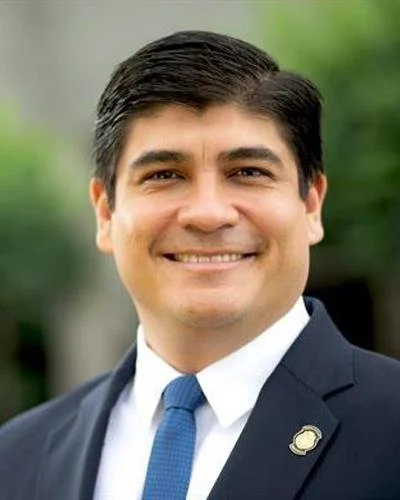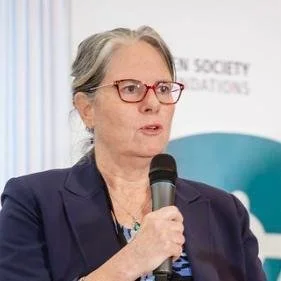
Overcoming misinformation about migration and migrants: a data-driven report on the positive impact of migration on economy and social development
About our Project
This policy report is a collaborative initiative of the Leir Institute for Migration and Human Security at the Fletcher School, Tufts University, and the Club de Madrid. It is led by Dr. Katrina Burgess, Professor of Political Economy and Director of the Leir Institute, and Carlos Alvarado Quesada, former President of Costa Rica (2018-2022) and Member of Club de Madrid.
Migration has long been at the center of public debate, but it is rarely treated as a complex public policy. For decades, political practice has reduced migration to a question of security—border control, enforcement, deterrence—while neglecting its broader economic, and social dimensions. This narrow framing has created a vicious circle: citizens, encouraged to see migrants primarily as threats, demand policies that reinforce those fears, which in turn deepen polarization and weaken democracy.
Yet migration is not a temporary emergency to be managed with suspicion; it is a permanent feature of our interconnected world. The choice is stark: governments can either continue to approach migration through fear and short-term politics; or they can adopt pragmatic, evidence-based strategies that unlock migration’s potential for shared prosperity.
This policy report is based on the conviction that we must urgently break free from the security-only lens. Migration cannot be wished away, nor can it be reduced to simplistic binaries of “open” versus “closed.” As populations age, as labor markets tighten, and as inequality strains social cohesion, migration will become increasingly central to both economic stability and democratic resilience. The question for policymakers is not whether to engage with migration, but how.
First brief
The first brief, Demographic Decline and the Role of Immigration, highlights a pressing reality: across the OECD, deaths will soon surpass births, ushering in a century of demographic contraction. Without immigration, shrinking populations will deepen labor shortages, strain pensions, and slow growth. Yet immigration alone cannot solve these challenges—the scale required is politically unrealistic and raises concerns about “brain drain” from sending countries. What migration can do is ease fiscal pressure when paired with strategies that boost productivity, raise participation across all groups, and support healthier ageing. Policymakers must therefore move past the false dichotomy of “migration versus no migration” and design integrated approaches that link mobility with broader demographic and economic planning.
THIRD brief
The third brief, Safe Pathways in an Era of Mixed Migration, examines the limited infrastructure available for orderly and regular migration. Irregular and risky routes prevail largely because safe alternatives—education, labor mobility, family reunification, humanitarian corridors—remain underdeveloped. Expanding these pathways is a governance as well as humanitarian imperative. Modernized visa systems, clear eligibility criteria, and accessible information platforms can reduce exploitation while creating win-win solutions for origin, transit, and destination countries. Migration will happen; the real choice is whether it will be safe and productive or chaotic and dangerous.
second brief
The second brief, Progress, Patents, and Knowledge Flows: The Immigration Advantage, shifts focus to innovation. Migrants are not only workers but also entrepreneurs, inventors, and taxpayers, generating long-term prosperity and cross-border knowledge flows. Yet these benefits are often obscured by electoral cycles and populist pressures that favor short-term rhetoric over evidence. This brief argues for insulating migration policymaking from partisan volatility and for transparent, data-driven communication that underscores migration as not just necessary but advantageous.
FOURTH brief
Finally, the fourth brief, Building Robust Democracies through Immigrant Inclusion, places migration within the struggle for democratic resilience. Populist parties exploit anti-immigrant sentiment to erode liberal norms, and mainstream parties that echo exclusionary rhetoric only reinforce the trend. Evidence shows a better path: comprehensive integration policies reduce xenophobia, weaken far-right mobilization, and strengthen democracy. Inclusion fosters contact, lowers perceived threats, and sustains a virtuous cycle of tolerance and civic participation. Robust democracies require robust inclusion.
Taken together, these four briefs sketch a vision of migration policy that is pragmatic, balanced, and humane. They show that migration is not a panacea, but neither is it the threat so often depicted in political discourse. It is a force multiplier—its impact depends on how societies choose to manage it. Managed with evidence, cooperation, and inclusion, migration can help address demographic decline, fuel innovation, strengthen democracy, and protect vulnerable people. Managed with fear and neglect, it can deepen inequality, destabilize integration, and erode trust in institutions.
This report seeks to reframe the debate: away from fear and securitization, and toward evidence, cooperation, and inclusion. If we get this right, migration can be not a dividing line but a shared path to prosperity and resilience:
Let’s separate migration policy from short-term politics. Decisions must be grounded in data and long-term public interest.
Let’s embed migration in a multilateral framework. No country can manage these dynamics alone.
Let’s invest in integration and public perception. Migrants succeed when given the tools to contribute, and societies succeed when they make space for new forms of belonging.
In the News
In many democracies, migration is often framed in emotional or security-driven terms that obscure the reality. In a recent Project Syndicate piece, Leir Director Katrina Burgess and Carlos Alvarado Quesada– former President of Costa Rica and Senior Fellow at the Leir Institute– offer a fresh perspective. They present migration not as a threat, but as a powerful driver of economic growth, democratic resilience, and international cooperation.
As they write:
“Managing migration well starts with considering the perspectives of all involved. We need more global and regional partnerships between origin, transit, and destination countries.”
Meet the Team
“Migration has long been at the center of public debate, but it is rarely treated as a complex public policy…The question for policy makers is not whether to engage, but how.”
— Policy Report: Overcoming misinformation about migration and migrants
Contact Us
Henry J. Leir Institute for Migration and Human Security
The Fletcher School of Law and Diplomacy
Tufts University
160 Packard Ave.
Medford, MA 02155 USA






